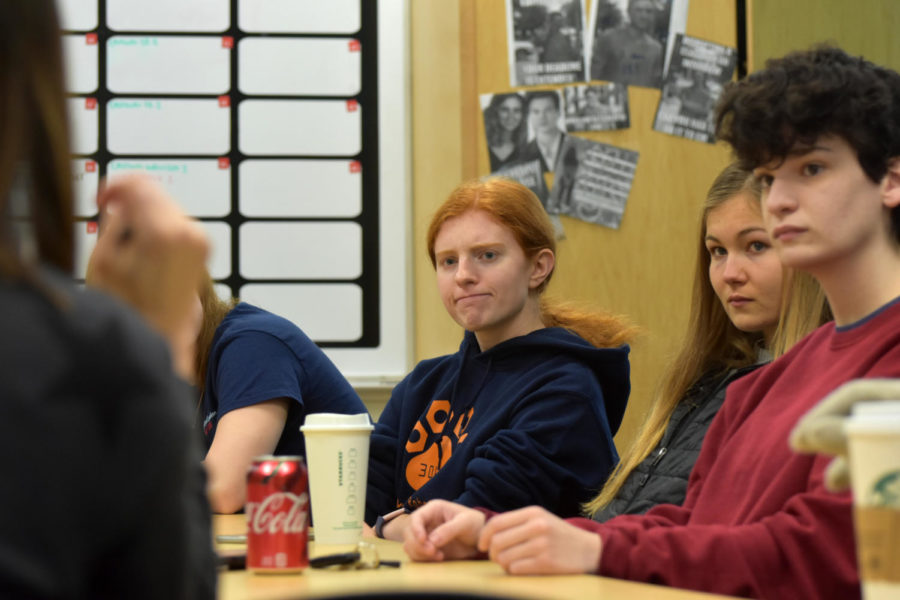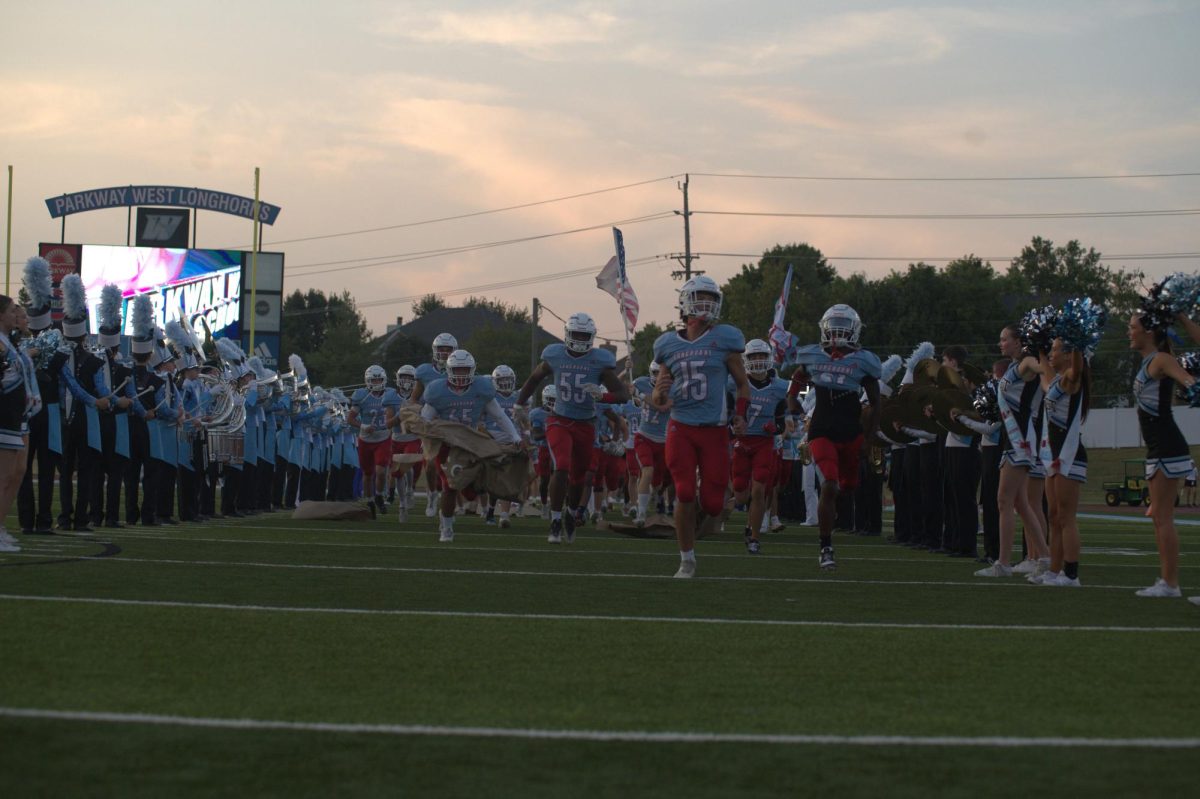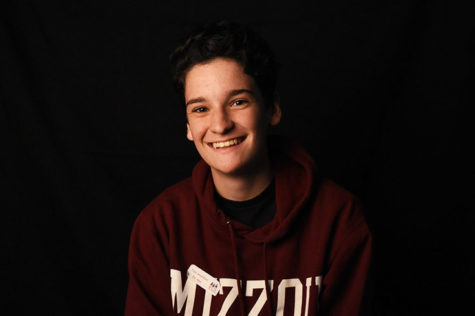The sun is still rising and the parking lot is only beginning to fill as 12 students sit around a table in room 3000, animated as they debate the use of an oxford comma in a story from that week and plan their trip to New York. Students furiously jot down notes for things they want to bring up next time—half an hour before school is never enough to cover everything.
As the bell rings there is a brief pause as most of the students exit the classroom, only for the chaos to re-enter with the first class of the day. Some students are only in room 3000 for five minutes before heading out to get interviews for their page on the yearbook and some stay in the classroom for four straight periods, using their study halls and any free moment to help newer students develop their stories for the newspaper. A constant flow of activity and chatter weaves its way through the room and out into the school, only ceasing long after most students have left the school. This is the newsroom for the PWest Pathfinder, the national award-winning student newspaper of Parkway West High School.
This is my fourth year on staff. As a senior planning on majoring in journalism next year, I am convinced that there is no better high school program for me to have learned the basics. I could justify this statement by pointing to the high-tech Mac desktops that line the walls of our room or our system in which students can check out a variety of top-notch cameras and lenses, but that would be misleading. Our advisor Debra Klevens has outfitted us with the resources necessary to succeed, but she has also given us something that is increasingly rare in high-school classrooms across America—freedom of the press.
Any story posted to the website is entirely student pitched, written and approved. Our administration does not require us to send it through them first, and on the rare occasion that they have a problem with something we write we receive a polite email in which we are simply made aware of the situation, not outright asked to remove or censor our content. And believe me, we’ve written our fair share of controversial stories over the years. From a news article bringing to light substance abuse in the Safe and Drug Free program to a recent editorial piece on the structuring of Parkway’s system for substitute teachers, we push against the administration’s policies, and they have had every opportunity to push back, hard, and limit the content we post.
Because of a court case started only a few districts over, Hazelwood School District v. Kuhlmeier, school administrators are entitled to prevent any content from being posted as long as they have legitimate concerns about its interference with learning. Since this ruling, 14 states have enacted press protections for student publications, but that means that 36 states (including Missouri) still uphold this ruling in their public schools. The Missouri New Voices Act has sought three times in recent years to change Missouri’s laws on student press freedom, only to be shot down in the Senate.
There is no doubt in my mind that this freedom granted by Parkway is the reason my peers and I are thriving today. When we wanted to write a satire piece pretending the school was turning a bathroom into a Juuling lounge, our principal Dr. Jeremy Mitchell fielded calls from concerned parents who thought the story was real, defending us as teaching the student body to be critical consumers of news. When we wrote an editorial about the understaffed counseling department, Dr. Mitchell and members of the department agreed to meet with us to discuss our concerns. Same goes for our piece on substitutes. And on secretaries. And on the March for Our Lives walkouts. The list goes on and on.
Sometimes it’s easy to get swept up in how open our administration is to the pushing of boundaries by students. This year I went to homecoming with my friend at Living Word Christian High School and was told I would not be welcome if I showed up in a suit—I was forced to wear a dress because of my gender. If I had chosen to publicly discuss my disagreement with the other school’s policy, I am certain that Dr. Mitchell and others at West would have had my back. I have not only come to expect their support of our free speech, but am also well aware of our freedom of expression as well; this policy would be unthinkable at West.
Time and time again it’s been proven by our school that students need support in pursuing new ideas and developing their opinions (along with guidance if they fail), not rules set to stop them before they can even begin to explore the real world.
The Hazelwood case is the Supreme Court telling students that avoiding political controversy is more important than their first amendment rights, which limits the self-discovery and learning that comes from being involved with the world around us. At West, however, we’re fortunate enough to have an administration that has created a safe space for us to explore new ideas without fear of censorship. This year is the 50-year-anniversary of the ruling in a different court case, Tinker v Des Moines, in which the Supreme Court ruled that, unless student speech would “materially and substantially interfere” with the operation of the school, it was allowed. In light of this anniversary, we urge other school districts and the United States government to take a long hard look at their policies and support the New Voices Act so that other students have the opportunity to thrive as we have. Until then, we as a staff at the Pathfinder would like to thank West for granting us opportunities that the law does not: the freedom to grow as people and members of society while exploring our passion for reporting.



![Sitting courtside before a junior varsity girls’ tennis match, senior Tanisi Saha rushes to finish her homework. Saha has found herself doing academic work during her athletic activities since her freshman year. “Being in sports has taught me how to stay organized and on top of my schoolwork. [With] a busy practice and game schedule, I’ve learned to manage my homework and study time better,” Saha said.](https://pwestpathfinder.com/wp-content/uploads/2025/11/DSC_0022-1200x800.jpg)
![Sophomore Maryem Hidic signs up for an academic lab through Infinite Campus, a grading and scheduling software. Some students enjoyed selecting their responsive schedule in a method that was used school-wide last year. “I think it's more inconvenient now, because I can't change [my classes] the day of, if I have a big test coming and I forget about it, I can't change [my class],” sophomore Alisha Singh said.](https://pwestpathfinder.com/wp-content/uploads/2025/10/DSC_0012-1200x801.jpg)
![Senior Dhiya Prasanna examines a bottle of Tylenol. Prasanna has observed data in science labs and in real life. “[I] advise the public not to just look or search for information that supports your argument, but search for information that doesn't support it,” Prasanna said.](https://pwestpathfinder.com/wp-content/uploads/2025/10/DSC_0073-2-1200x800.jpg)
![Junior Fiona Dye lifts weights in Strength and Conditioning. Now that the Trump administration has instituted policies such as AI deregulation, tariffs and university funding freezes, women may have to work twice as hard to get half as far. "[Trump] wants America to be more divided; he wants to inspire hatred in people,” feminist club member and junior Clara Lazarini said.](https://pwestpathfinder.com/wp-content/uploads/2025/05/Flag.png)
![As the Trump administration cracks down on immigration, it scapegoats many immigrants for the United States’ plights, precipitating a possible genocide. Sophomore Annabella Whiteley moved from the United Kingdom when she was eight. “It’s pretty scary because I’m on a visa. When my visa expires next year, I’m not sure what’s going to happen, especially with [immigration] policies up in the air, so it is a concern for my family,” Whiteley said.](https://pwestpathfinder.com/wp-content/uploads/2025/05/DSC_0077-7copy.jpg)
![Shifting global trade, President Donald Trump’s tariffs are raising concerns about economic stability for the U.S. and other countries alike. “[The tariffs are] going to pose a distinct challenge to the U.S. economy and a challenge to the global economy on the whole because it's going to greatly upset who trades with who and where resources and products are going to come from,” social studies teacher Melvin Trotier said.](https://pwestpathfinder.com/wp-content/uploads/2025/05/MDB_3456-1200x800.jpg)



![Some of the most deadly instances of gun violence have occurred in schools, communities and other ‘safe spaces’ for students. These uncontrolled settings give way to the need for gun regulation, including background and mental health checks. “Gun control comes about with more laws, but there are a lot of guns out there that people could obtain illegally. What is a solution that would get the illegal guns off the street? We have yet to find [one],” social studies teacher Nancy Sachtlaben said.](https://pwestpathfinder.com/wp-content/uploads/2025/01/DSC_5122-1200x800.jpg)

![Sophomore Shree Sikkal Kumar serves the ball across the court in a match against Lindbergh. Sikkal Kumar has been a varsity member of the varsity girls’ tennis team for two years, helping her earn the number two rank in Class 2 District 2.“When matches are close, it’s easy to get nervous, but I [ground] myself by[staying] confident and ready to play,” Sikkal Kumar said.](https://pwestpathfinder.com/wp-content/uploads/2025/11/DSC2801-1200x798.jpg)
![Dressed up as the varsity girls’ tennis coach Katelyn Arenos, senior Kate Johnson and junior Mireya David hand out candy at West High’s annual trunk or treat event. This year, the trunk or treat was moved inside as a result of adverse weather. “As a senior, I care less about Halloween now. Teachers will bring their kids and families [to West’s Trunk or Treat], but there were fewer [this year] because they just thought it was canceled [due to the] rain. [With] Halloween, I think you care less the older you get,” Johnson said.](https://pwestpathfinder.com/wp-content/uploads/2025/10/DSC00892-1-1200x800.jpg)
![Focused on providing exceptional service, sophomore Darsh Mahapatra carefully cleans the door of a customer’s car. Mahapatra has always believed his customers deserve nothing less than the best. “[If] they’re trusting us with their car and our service, then I am convinced that they deserve our 100 percent effort and beyond,” Mahapatra said.](https://pwestpathfinder.com/wp-content/uploads/2025/10/DSC_0018-1200x800.jpg)
![Sophomore Aleix Pi de Cabanyes Navarro (left) finishes up a soccer game while junior Ava Muench (right) warms up for cross country practice. The two came to Parkway West High School as exchange students for the 2025-2026 school year. “The goal for the [exchange] program is to provide opportunities for both Parkway students and our international exchange students to learn about other cultures, build connections and become confident, capable, curious and caring — Parkway’s Four C’s — in the process,” Exchange Program Lead Lauren Farrelly said.](https://pwestpathfinder.com/wp-content/uploads/2025/10/Feature-Photo-1200x800.png)
![Leaning on the podium, superintendent Melissa Schneider speaks to Parkway journalism students during a press conference. Schneider joined Parkway in July after working in the Thompson School District in Colorado. “My plan [to bond with students] is to get things on my calendar as much as possible. For example, being in [classes] is very special to me. I am trying to be opportunistic [meeting] kids [and] being in [the school] buildings. I have all the sports schedules and the fine arts schedules on my calendar, so that when I'm available, I can get to them,” Schneider said.](https://pwestpathfinder.com/wp-content/uploads/2025/09/IMG_5425-1200x943.jpeg)
![Gazing across the stage, sophomore Alexis Monteleone performs in the school theater. The Monteleone family’s band “Monte and the Machine” has been releasing music since 2012, but Alexis started her own solo career in 2024 with the release of her first single, Crying Skies. “My whole family is very musical, [and I especially] love writing [songs with them],” Monteleone said.](https://pwestpathfinder.com/wp-content/uploads/2025/09/DSC7463-1200x798.jpg)

![Leaping through the air, senior Tyler Watts celebrates his first goal of the season, which put the Longhorns up 1-0 against the Lafayette Lancers. Watts decided to play soccer for West for his last year of high school and secured a spot on the varsity roster. “[Playing soccer for West] is something I had always dreamed of, but hadn’t really had a good opportunity to do until now. It’s [really] fun being out [on the field], and I’m glad I decided to join the team. It’s just all about having fun with the boys and enjoying what time we have left together,” Watts said.](https://pwestpathfinder.com/wp-content/uploads/2025/09/DSC_1951-1200x855.jpg)


